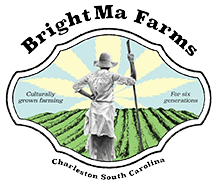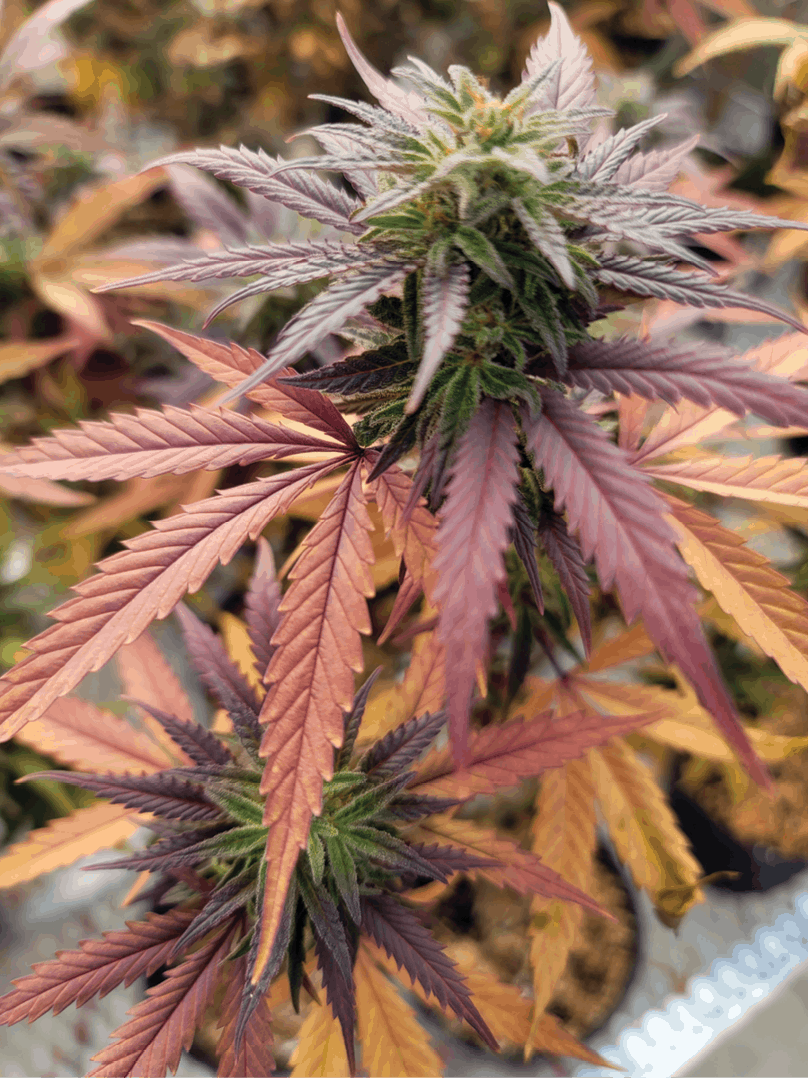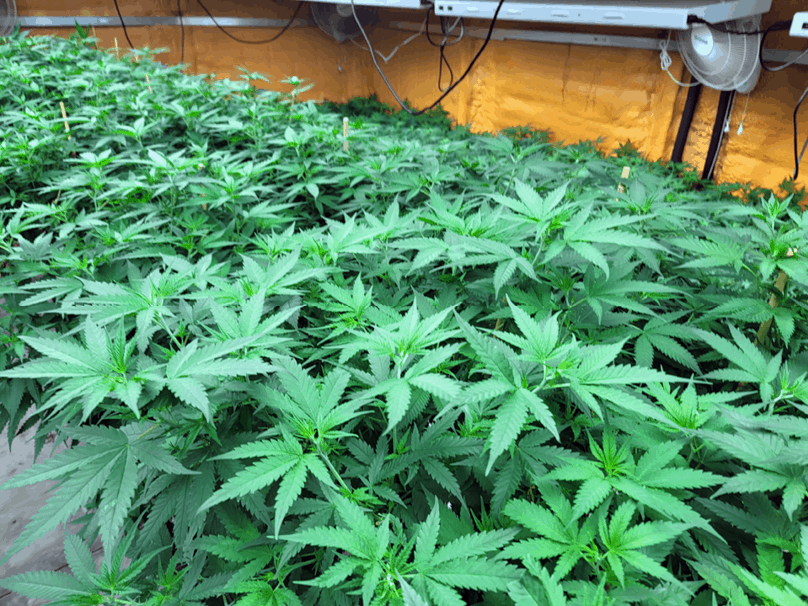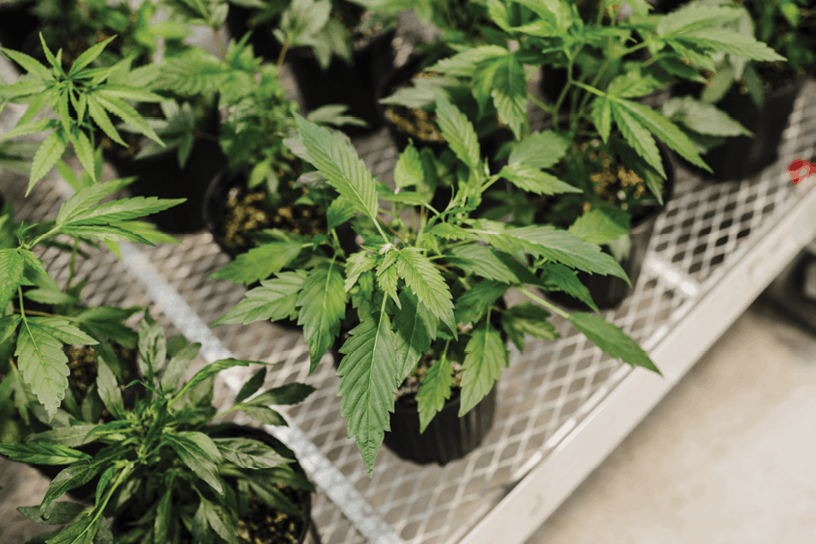
Left to right: BrightMa Farms’ Sherman Evans, director of sales and marketing; Dwayne Green, member manager; Brandon Hudson, director of cultivation; Jean-Marc Villain, chief operating officer; and Harold Singletary, founder and CEO
While stationed at the Schofield Barracks U.S. Army base in Hawaii in the early 1990s, Harold Singletary received a call from his mother, Anna Delores Singletary. She told him that an author, Edward Ball, had uncovered information about the Singletarys’ ancestors.
Ball, a descendant of slaveholders, wrote about the history he unearthed. His story included the lives of the Singletarys’ forebearers, who were slaves to the Ball family.
“My mom called me and said, ‘Wow, all of this history is coming out,’” Harold Singletary says, adding that it can be difficult for many African Americans to trace their family histories.
Singletary’s family members, including his late grandmother, Katie Roper, spoke with the author in the ’90s, sharing oral history and information from documents such as labor contracts, as cited in Ball’s book, “Slaves in the Family.” When Katie Roper was about 10, her grandmother and namesake, Katie Heyward, reenacted for her granddaughter how she ran into a river to escape a beating while she was enslaved.
“She ducked in the water, and swam,” Roper told Ball. “I got excited, and started crying. And I screamed murder! I said, ‘Oh Lord, the ’gators going to eat her!’”
Heyward, also known as “Bright Ma” for reasons that have been lost to history, was forced to work in the field, likely growing rice, on the Balls’ Comingtee Plantation in Berkeley County, S.C. When she was freed in 1865, she settled on a 10-acre plot of land in Cordesville, S.C.
Today, Harold Singletary runs his hemp business—BrightMa Farms—on that land in Cordesville. It’s where ancestors between him and Bright Ma in the family lineage grew food for sustenance and near where they fished commercially. It’s near where his grandmother became fearful of water after Bright Ma jumped in the river.
“It’s been in my family for many, many years,” Singletary, BrightMa Farms’ founder and CEO, says of the land he inherited from Roper. “I’m just happy—it meant a lot to my grandmother. She would take her little bit of change and pay the property taxes. And I never wanted to lose it once she left it to me.”
With hemp, Singletary, an accountant and entrepreneur in the financial sector, is growing a plant that he says helps both people and the earth heal—and which can allow Black farmers and other farmers of color to create generational wealth and thrive.
BrightMa Farms runs a 3,000-square-foot headhouse and 7,200-square-foot greenhouse on the land in Cordesville and has offices in Charleston, S.C. The licensed nursery propagates a variety of hemp cultivars used for cannabinoid, grain and fiber production, and then sells the rooted clones to growers for them to mature and sell on a large scale. BrightMa also advises those growers through harvest. In addition to its cloning operations, BrightMa also breeds hemp, conducts research and development, and grows boutique smokable flower.
One of Singletary’s overarching goals is creating a global circular economy focused on reducing waste by incorporating hemp as a sustainable alternative for other materials, such as tree-sourced paper and synthetic plastics, and then either processing it at BrightMa Farms or selling it to another processor.
“My [customer] farmers and minority farmers will always have a value proposition within my circular economy,” Singletary says. “I will provide them genetics, I will provide them the understanding of how to grow, and we will process and then everyone will win. But there need to be more opportunities where we can be positioned to have not just a farm but processing capabilities and other components within the supply chains to be successful.”
To that end, Singletary says BrightMa Farms aims to buy product back from the growers it works with and process it for a variety of end uses, such as textiles, “advanced material composites” for the automotive sector, and plant-based foods.
To that end, Singletary says BrightMa Farms aims to buy product back from the growers it works with and process it for a variety of end uses, such as textiles, “advanced material composites” for the automotive sector, and plant-based foods.



Courtesy of BrightMa Farms

Courtesy of BrightMa Farms

Courtesy of BrightMa Farms
Singletary, who is from Charleston, grew up working on a farm owned by his grandparents, Katie and Ned Roper, on James Island, S.C.
“It’s a hard life,” he says. “To do large-scale farming—I never wanted to do that at all. I’m an accountant by trade. I wanted to understand business and finance. That allowed me to structure, raise capital, use a network and also create a different solution to farm, which was indoor farming.”
A desire to help create opportunities for African American farmers, plus a few other experiences, inspired Singletary to enter the hemp marketplace.
For one, his mother, Anna Delores, suffered from bone cancer. She received two bone marrow transplants but ultimately lost her battle with the disease in 2016. When she was still alive, Singletary provided her with cannabidiol (CBD) and tetrahydrocannabinol (THC), which he says allowed her to retain a better quality of life than prescription opioids did.
Hemp and cannabis also helped Singletary deal with anxiety and post-traumatic stress disorder (PTSD) from his U.S. Army infantry enlistment. He was deployed to Haiti for six months in 1995 as part of Operation Uphold Democracy, for which he received an Armed Forces Expeditionary Medal. He entered conflict zones and other dangerous situations where he fired weapons and witnessed casualties. “Even any soldier being put into any warfare or heavy, stressful situations—you will acquire anxiety or PTSD,” he says. “Then, trying to come back out of those types of situations … into a normal society—and adapt to what may not be intense anymore—how do you navigate that?”
For one, his mother, Anna Delores, suffered from bone cancer. She received two bone marrow transplants but ultimately lost her battle with the disease in 2016. When she was still alive, Singletary provided her with cannabidiol (CBD) and tetrahydrocannabinol (THC), which he says allowed her to retain a better quality of life than prescription opioids did.
Hemp and cannabis also helped Singletary deal with anxiety and post-traumatic stress disorder (PTSD) from his U.S. Army infantry enlistment. He was deployed to Haiti for six months in 1995 as part of Operation Uphold Democracy, for which he received an Armed Forces Expeditionary Medal. He entered conflict zones and other dangerous situations where he fired weapons and witnessed casualties. “Even any soldier being put into any warfare or heavy, stressful situations—you will acquire anxiety or PTSD,” he says. “Then, trying to come back out of those types of situations … into a normal society—and adapt to what may not be intense anymore—how do you navigate that?”